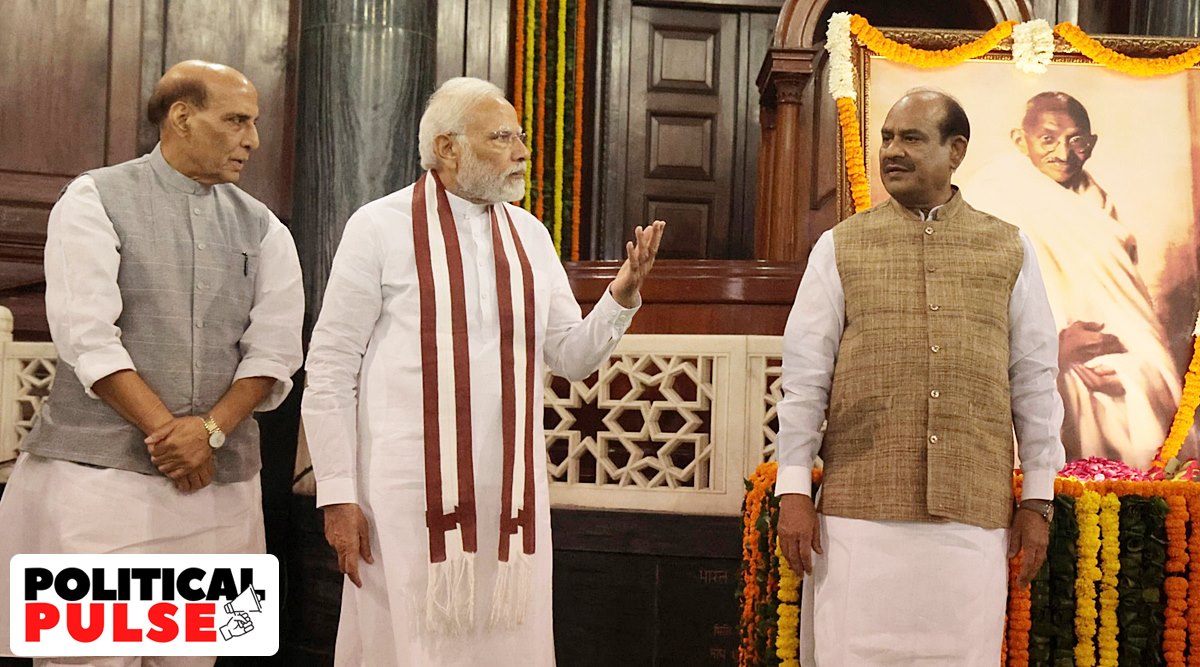In reply to former Congress president Sonia Gandhi’s letter to Prime Minister Narendra Modi over the special Parliament session starting soon, Parliamentary Affairs Minister Pralhad Joshi said she was trying to politicise the functioning of Parliament.
“It is very unfortunate that you are trying to politicise the functioning of Parliament, our temple of democracy, and create unnecessary controversy,” Joshi said, adding that the Parliament session from September 18 to 22 had been convened after following all established procedures and that political parties are never consulted in advance.

In her letter to the PM, Sonia wrote: “I must point out that this special session has been convened without any consultation with other political parties. None of us have any idea of its agenda. All we have been communicated is that all five days have been allocated for government business.”
So, how and when is Parliament convened?
The power to convene a session of Parliament rests with the government. The decision is taken by the Cabinet Committee on Parliamentary Affairs, and formalised by the President, in whose name MPs are summoned to meet for a session.
Explained | Special session of Parliament: How it will work
India does not have a fixed parliamentary calendar. By convention, Parliament meets for three sessions in a year. The longest, the Budget Session, starts towards the end of January, and concludes by the end of April or first week of May. The session has a recess so that Parliamentary Committees can discuss the budgetary proposals.
The second session is the three-week Monsoon Session, which usually begins in July and finishes in August. The parliamentary year ends with a three week-long Winter Session, which is held from November to December.
A general scheme of sittings was recommended in 1955 by the General Purpose Committee of the Lok Sabha. It was accepted by the Jawaharlal Nehru government, but was not implemented.
The Constitution
The summoning of Parliament is specified in Article 85 of the Constitution. Like many other Articles, it is based on a provision of The Government of India Act, 1935, which specifies that the central legislature be summoned at least once a year, and that not more than 12 months elapsed between two sessions.
Dr B R Ambedkar, however, said that the purpose of that provision had been to summon the legislature only to collect revenue, and that the once-a-year meeting was designed to avoid scrutiny of the government by the legislature. His drafting of the provision reduced the gap between sessions to six months, and specified that Parliament should meet at least twice a year.
In Premium | Parliament special session: Caught by surprise, Opp in Mumbai steps on the gas on Plan 2024
“The clause as it stands does not prevent the legislature from being summoned more often than what has been provided for in the clause itself. In fact, my fear is, if I may say so, that the sessions of Parliament would be so frequent and so lengthy that the members of the legislature would probably themselves get tired of the sessions,” he said during Constituent Assembly debates.
Prof K T Shah from Bihar was of the opinion that Parliament should sit throughout the year, with breaks in between. Prof Shah also wanted the presiding officers of the two Houses to be empowered to convene Parliament in certain circumstances.
These suggestions were not accepted.
Over the years, there has been a decline in the sittings of Parliament. During the first two decades of Parliament, the Lok Sabha met for an average of a little more than 120 days a year. This has come down to approximately 70 days in the last decade.
Most Read 1Chandrayaan-3 mission: Dawn breaks on Moon, all eyes on lander, rover to wake up 2As Indo-Canadian relations sour, anxiety grips Indian students, residents who wish to settle in Canada 3Karan Johar says Sanjay Leela Bhansali did not call him after Rocky Aur Rani: ‘He’s never called me but…’ 4Gadar 2 box office collection day 40: Hit by Shah Rukh Khan’s Jawan onslaught, Sunny Deol movie ends BO run with Rs 45 lakh earning 5Shubh’s tour in India cancelled: Why is the Canada-based singer facing the music?
Special sessions
The coming special session – outside the regularly scheduled Budget, Monsoon and Winter Sessions – will be the second one held by the Narendra Modi-led government. The last time Parliament held such a special session was in 2017. In a midnight sitting of both the Lok Sabha and Rajya Sabha, the government had rolled out the Goods and Services Tax, calling it the biggest indirect tax reform since Independence, that replaced all central and state taxes with a single tax.
Also in Political Pulse | Special session: Only one earlier held by Modi govt, for GST rollout; many Opp parties stayed out of ‘publicity stunt’
It was the first time a legislative Act was the subject of a special midnight session – the previous ones were held to commemorate events of historic significance.
Also ReadBoost for women empowerment, says PM Congress never made OBC PM, BJP did:…Chill in Nitish, INDIA ties grows: Boycott of TV anchors to coordination …Siddaramaiah-Shivakumar rivalry continues to simmer in Karnataka as proxi…India-Canada diplomatic row: BJP and Congress slam Justin Trudeau, Akalis…
Midnight sessions were previously held on August 15, 1997, to commemorate the 50th anniversary of India’s Independence; on August 9, 1992, for the 50th anniversary of the Quit India Movement; on August 15, 1972, to celebrate the silver jubilee of Independence; and the first ever, on August 14-15, 1947, on the eve of Independence.


